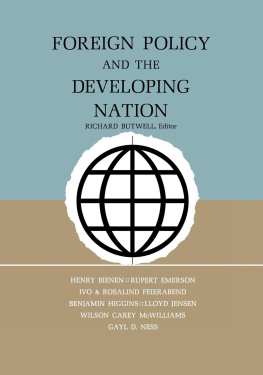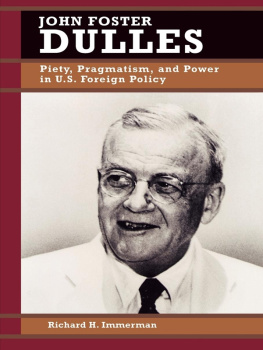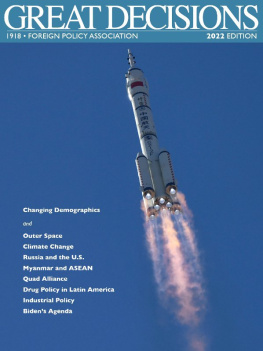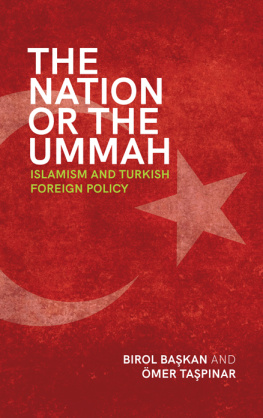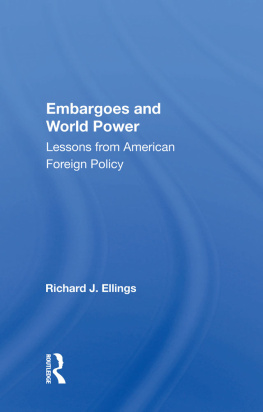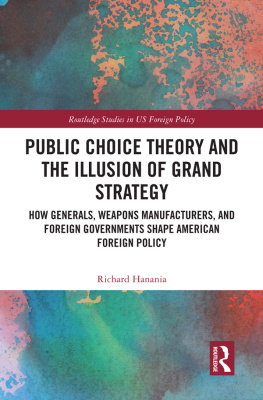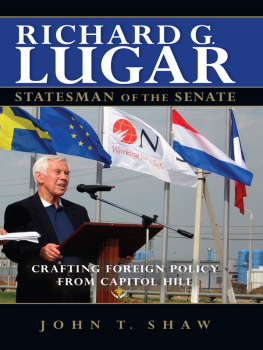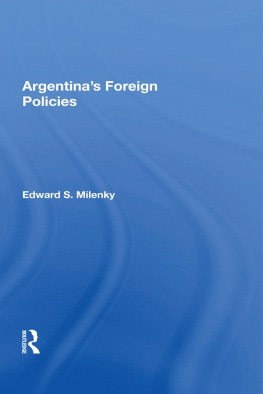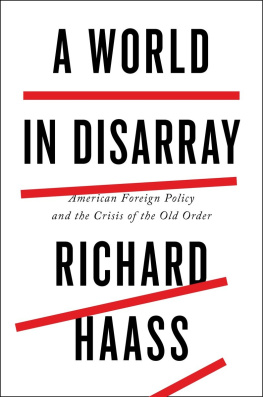CONTENTS
INTRODUCTION
CONTEMPORARY INTERNATIONAL RELATIONS AND DEVELOPMENT
RICHARD BUTWELL
CHAPTER ONE
POLITICAL DEVELOPMENT AND FOREIGN POLICY
WILSON CAREY McWILLIAMS
CHAPTER TWO
FOREIGN POLICY AND SOCIAL CHANGE
GAYL D. NESS
CHAPTER THREE
FOREIGN POLICY, THE MILITARY, AND DEVELOPMENT: MILITARY ASSISTANCE AND POLITICAL CHANGE IN AFRICA
HENRY BIENEN
CHAPTER FOUR
FOREIGN ECONOMIC POLICY AND ECONOMIC DEVELOPMENT
BENJAMIN HIGGINS
CHAPTER FIVE
LEVEL OF DEVELOPMENT AND INTERNATION BEHAVIOR
IVO K. AND ROSALIND L. FEIERABEND
with Frank W. Scanland III and John Stuart Chambers
CHAPTER SIX
LEVELS OF POLITICAL DEVELOPMENT AND INTERSTATE CONFLICT IN SOUTH ASIA
LLOYD JENSEN
CHAPTER SEVEN
AMERICAN INFLUENCE IN DEVELOPED AND UNDERDEVELOPED COUNTRIES
RUPERT EMERSON
T HE SYSTEM of international relations that existed on the eve of World War II was altered considerably in the years which followed that costly conflict. Before the war what was called international relations was essentially the relations among the countries of Europe, where the nation-state had developed. The United States and Japan, both located outside Europe, had been drawn into the system and were, as a matter of fact, the major belligerents in the Pacific phase of the war between 1941 and 1945. The other major powers, however, were European states (Britain, France, Germany, and the Soviet Union), and large areas of the world were colonies of the first two countries as well as of such smaller nations as the Netherlands, Portugal, and Spain. The Americans and the Japanese, moreover, had earlier become colonial powers in their own right. The system, which was becoming truly international before World War II, was still nonetheless mainly Europe-centered when the decade of the forties began.
The war accelerated the process of internationalization of the system of relations among countries. The major European colonial powers were so weakened by this most devastating war among themselves that they were unable in the wars wake to maintain their dominance over their subject territories of Asia and Africa, although, with the exception of the United States and Britain, they tried to do so. Japans conquests in Southeast Asia in particular were to have a catalytic effect in ending European colonial rule in this part of the world, as Burmese, Indonesians, and Vietnamese, among others, vowed never again to allow themselves to be governed by aliens. This surge to independence subsequently spread to other parts of the world, particularly Africa. The nationalist movements of these emergent states thus combined with the weakened circumstances of the European colonial powers to transform the system of international relations in revolutionary ways.
By the start of the 1960s the international system was altogether different from what it had been before the war, although it resembled the old system in enough ways to blind some observersand even a few participantsto the dimensions of the changes involved. In the old system the participants, whatever their size, were at more or less the same level of development. The concept of the sovereign equality of states was in this sense an accurate reflection of the relations among the nations that made up the system. The admission of the United States and Japan to the system marked the beginning of its revolutionary transformation. Their entrance into the international system was the result primarily of their acquisition of those characteristics that seemed to separate the European states from most of the other peoples of the world, that is, their level of development economically, technologically, and politically.
There are at least three main differences between the nature of the system of international relations as it existed in 1939 and as it functions today: its scope, its decreasing domination by the states of western Europe, and, perhaps most important, the unparalleled variation in the levels of development of the participants in the system. France and Holland may have differed in size (and military power) historically, but never in the history of the European system of international relations did they differ in their levels of general development as, say, Germany and Indonesia or Japan and Algeria do today.
There is today growing recognition of the relationship between development and international relations, however vague and inadequately formulated the perception of this relationship may sometimes be. The contemporary use of aid or assistance as a foreign policy tool is the most conspicuous evidence of this recognition. Immediate postwar American aid to Europe, Japan, and the Philippines was rehabilitative. Later, aid was designed, as some of its critics claimed, to win, if not buy, friends (and American foreign assistance, unfortunately, is even today too frequently defended in such terms to win necessary congressional financing). But those who formulate and direct United States aid programs in the executive branch of the government are, for the most part, concerned with assisting less developed countries through the often painful process of modernization. They see this as a way of making the world more the kind of one in which the United States and other have nations can themselves continue to develop and prosper.
Foreign aid, accordingly, may be viewed as testimony to two beliefs existent among American (and other) foreign policymakers: (a) that differing levels of development may influence, possibly adversely, the very system of interstate relations that has become universal in the years since World War II, and (b) that external agents can play a part in raising the level of livingand of the state of the economy and of the governmental and other organizations that direct itof the less developed states of the world.
The drive to development, on the other hand, is by no means mainly externally stimulated. The nationalist surge to independence was not simply motivated; it sought independence politically from alien rule, but it was also motivated by a belief that low living standards and other dimensions of underdevelopment were primarily the result of foreign control and exploitation. The termination of colonial rule, it was believed, would be followed by a veritable millennium of progress and prosperity. Independence came much earlier than most Asians and Africans believed it would, but, for the most part, it did not prove to be the dramatic beginning of a new and exciting era of rapid material development or improved living standards. But neither did it proveagain, for the most partto be frustrating to the point of resignation and abandonment. Trying and often bitter setbacks notwithstanding, the new states have remained true to their previously proclaimed goals of modernizing in various ways their still largely underdeveloped societies.
Both the new system of interstate relations and the multifaceted phenomenon of development, achieved and desired, have been studied by growing numbers of scholars. But the relationship between foreign policy and development has been only modestly explored. This is surprising in view of the increasingly emphasized influence of internal factors upon foreign policy formulation and execution in the literature of international relations since the early 1950s. The impact upon foreign policy of ideology, public opinion, elite composition, and the pressamong other variableshas been studied. But no studies have sought to investigate the influence upon foreign policy of the level of development of a state or states seeking to influence one or more other states, or the states toward which such efforts are directed. Often some of the factors that have come to be considered within the general concept of development, such as the level of technical education in a country, have been treated but almost always as separate factors in their own right.


